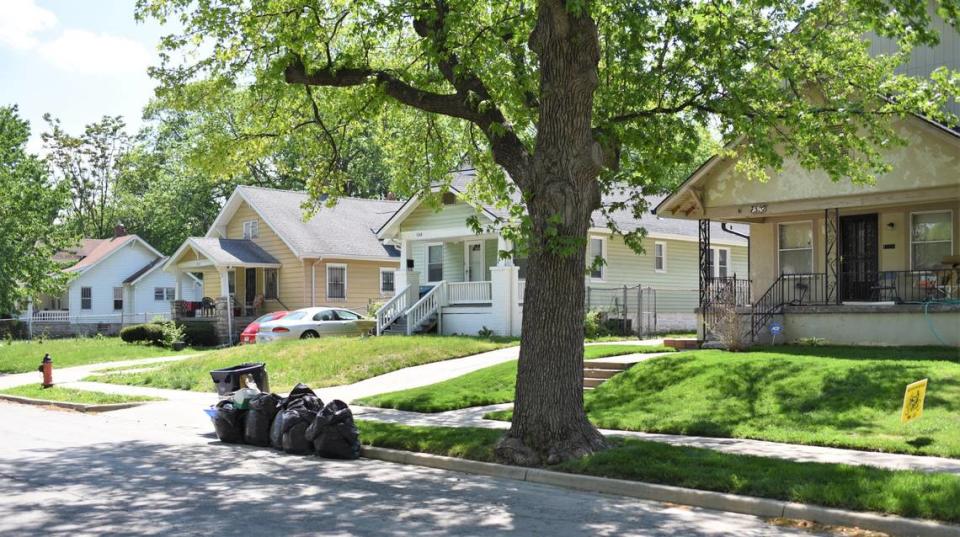Attacker who killed KC mom convicted, but questions linger: ‘Not satisfied whatsoever’
A “butterfly,” “life force,” ”beautiful” and “brilliant.”
Those were some of the words Shannon Hopkins chose to describe his daughter at the sentencing last month of the man who pleaded guilty to murdering her.
It’s been just over two years since 24-year-old Mackenzie “Mickey” Hopkins was found dead, submerged in a bathtub, with her then 4-year-old daughter, Bella, found on the bed suffering from severe head trauma.
Their attacker, 32-year-old Jose E. Escalante-Corchado, reached a deal and pleaded guilty last month to the lesser charge of second-degree murder in her killing and to the charge of first-degree assault of her daughter.
A judge sentenced Escalante-Corchado to 30 years in a Missouri prison on each count, with the sentences to run concurrently. Other charges of armed criminal action and first-degree endangering the welfare of a child were dismissed as part of the plea agreement.
Shannon Hopkins said Mickey’s family reached the agreement with the guidance of prosecutors. The case was set to go to trial this month, but prosecutors had told the family that because police had not found the weapons, they felt the judge presiding over the case likely would want the charge in Mickey’s death reduced to second-degree murder. The maximum penalty if he were found guilty of that charge would be 25 years.
“In the end, I guess we were satisfied that we did the best we could for Mickey and Bella,” Hopkins said. “I don’t know that I will be completely satisfied or completely convinced that I — that we did the absolute best thing, but at the time, we felt this was something we needed to do.”
But other aspects of the case still anger him and have him searching for answers, including the fact that two Kansas City police officers responded to Mackenzie Hopkins’ home on a 911 call and left without going inside 12 hours before she was found dead.
Loving mother, healthcare worker
Mackenzie Hopkins, the middle of three children, started her career in nursing homes. At the time of her death, she was working as a certified nursing assistant at North Kansas City Hospital and taking college courses to become a registered nurse.
“She had deep feelings for anyone that she loved, anyone that was a friend of hers and it carried over to her job and the people that were in her charge,” her father Shannon Hopkins said.
She was a natural mother, and when she had Bella, Mickey realized that she loved being a mom, Shannon Hopkins said.
She and her daughter’s father, Hector, split up but remained close. They had planned to co-parent their daughter. After living with her parents for about a year, Mickey decided to find a place for her and Bella to call their own.
Shannon Hopkins said he was concerned about her moving to a more urban area, but said Mickey was very independent and focused on raising Bella. The new location would also be closer to work.
“She convinced me that she was a big girl and she could handle things, and I know that, so I eventually became okay with the situation,” he said.
Two weeks before she was killed, Shannon Hopkins helped her move into the new house in the 7300 block of Wabash Avenue. He briefly met Escalante-Corchado, the boyfriend of one of Mickey’s friends.

On Jan. 15, 2022, the day of her murder, Mickey Hopkins had made plans to be with family. After not hearing from her, Shannon Hopkins tried calling around noon to see when she wanted to get together. There was no answer, but he wasn’t worried because he knew she had been watching movies late. Plus, she had an eclectic schedule because of her job.
But as the afternoon progressed, Shannon Hopkins started to worry. Eventually, he and his younger daughter decided to check on them. It had snowed that day, so the going was slow.
Halfway there, Hopkins decided to call the police to do a welfare check. Officers arrived shortly before him. By then, it was nighttime, and the house was dark. They asked if Hopkins could open the door. As he put the key in, it pushed open. It wasn’t locked.
Hopkins stepped in as police turned on their flashlights, revealing blood on the floor. His younger daughter screamed, and police pulled him outside.
Not satisfied with answers
During the investigation, detectives learned that police officers had responded to her home about 12 hours earlier in the day after a 911 call was placed from her cellphone. A call taker could hear the sound of a struggle and people fighting. The person who dialed 911 didn’t terminate the call.
After going to the home, the two officers left without going inside.
Detectives told Hopkins’ family that the officers could not enter the house because of a policy change that came after the conviction of Eric DeValkenaere, a white Kansas City police detective found guilty of involuntary manslaughter in the 2019 fatal shooting of 26-year-old Cameron Lamb, a Black man.
Police denied any changes in practice or policy were made in response to the DeValkenaere case, in which the former officer was faulted for going onto private property without probable cause. His conviction was upheld on appeal, and the Missouri Supreme Court declined to review it last month.
Shannon Hopkins said that police haven’t been forthcoming with what happened that morning and the officers’ specific actions.
“I’m not satisfied whatsoever about the answers that we’ve gotten,” said Hopkins, who is working with a family attorney to see if they could get more answers on the officers’ actions.

The Star requested the investigative file under the Missouri Sunshine Law, but was turned down because it is currently considered a closed record, a police spokeswoman said.
“If appeals are still available for the person charged the case would remain closed per Missouri Sunshine law until any/all appeals are no longer available,” said Officer Alayna Gonzalez, a spokeswoman for the Kansas City Police Department.
Information regarding the actions of the officers who responded to the initial 911, including what the officers noted when they arrived, the steps they took to investigate the call and the reason they didn’t inside, also is also a closed record for the same reason, Capt. Jake Becchina said Monday.
The information requested by The Star “would be part of the ongoing investigation and as such not publicly available at this time,” Becchina said.
The officers’ actions have left the Hopkins family wondering what would have happened if they had entered the home that morning. Could the officers have saved Mickey’s life and prevented Bella from being injured?
Video from surveillance and traffic cameras allegedly showed Escalante-Corchado entering Hopkins’ backyard the morning of her murder. Fifteen minutes later, a 911 call was placed on her cellphone. Escalante-Corchado was seen running from the home one minute later.
Shortly after, he is seen entering a gas station convenience store at 70th Street and Prospect Avenue. After police left Hopkins’ home, he allegedly ran back to the house and went around back, according to court documents. He walked out two hours later.
Escalante-Corchado became a suspect after his girlfriend told detectives she wanted to go out the night before Hopkins’ was killed and used Hopkins as a cover story even though the two were not going out, according to court documents. The girlfriend also told police that when she returned home about midnight, Escalante-Corchado was not there.
As the case progressed toward trial, Hopkins’ family learned that Escalante-Corchado was an undocumented immigrant who was not in the U.S. legally. Shannon Hopkins said he believes his daughter’s killer should not have been in the country.
He believes that “because there are so many legal immigrants in this country, wonderful people who have done what our law says that they must do to become legal residents of this country, that people who do not do that should not be here,” he said.
Hopkins sees the murder of his daughter and brutal attack of his granddaughter as an argument as to why the nation needs to enforce its immigration laws. However, he doesn’t necessarily believe that crossing an international border illegally makes someone more or less likely to commit crimes, he said.
“The ONLY fact that I have to base my belief that SOME illegal immigrants commit murder is that (one) murdered my daughter and attempted to murder my granddaughter,” he said in an email.
Studies, in fact, show that immigrants, regardless of status, are more law-abiding than native-born American citizens.
The Jackson County Prosecutor’s Office discussed Escalante-Corchado’s immigration status during mediation before the case went to trial, said spokesman Michael Mansur.
Escalante-Corchado’s immigration status was unknown at the time he was charged and was not a contributing factor in the state’s pursuit of the prosecution of this defendant, he said. The case was handled like any other, according to Mansur.
It was discussed simply as a collateral consequence of a guilty plea, Mansur said. At Escalante-Corchado’s sentencing and plea, the judge said he would not be able to protect Escalante-Corchado from any actions during or after his sentence was served due to his undocumented status, Hopkins said.
A spokesperson for U.S. Immigration and Customs Enforcement said the agency would not release any information on Escalante-Corchado at this time.
‘Family’s miracle’
Bella, who spent several weeks in intensive care, is doing very well and now lives with her father, Hector, in Puerto Rico, Shannon Hopkins said.
Hector planned to stay in Kansas City to be around her extended family. At the same time, she had many cousins, aunts, uncles, and a grandmother in Puerto Rico.
But after about a year, Bella had negative experiences triggered by her memories. Hector tried counseling but decided it might be best if they made a new start, Hopkins said.
After speaking to his mother in Puerto Rico, Hector sat with the Hopkins to discuss the matter.
“It was a very difficult decision for him to make, and he wanted us to work together with him to decide whether it was the right decision or not,” Hopkins said.
Initially, they were unsure, but after they had some time to think about it, they told Hector that they would support his decision. They just wanted to make sure she could visit on a regular basis.
“We talk to her almost daily,” Hopkins said.
After six months there, she was versed in Spanish and is now bilingual and speaks fluently.
“She’s amazing,” said Hopkins.
They had been told while she was in the hospital that she would likely have some learning disabilities and have difficulty learning to walk and talk again. But after 30 days in the hospital, she was doing all of those things at the level that she had before the injuries.
Hopkins’ family is proud of Bella, Hector, and his family for helping raise her.
Despite the physical injuries and the traumatic memories, she’s “just a normal “happy-go-lucky” six-year-old girl on most days, Hopkins said.
“Obviously, she has some bad days, and those will probably not ever stop happening, but she’s just our family’s miracle,” Hopkins said.
The Star’s Bill Lukitsch provided information for this story.

